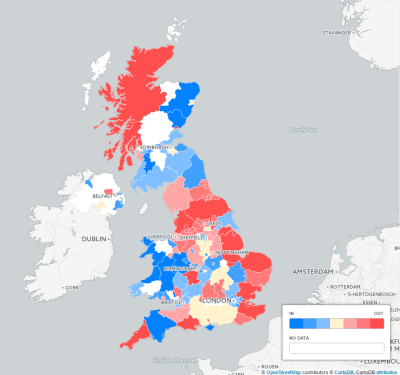Twitter Reveals That the UK Will Vote to Leave the EU
June 4, 2016
 T
T
he majority of people Tweeting about the forthcoming referendum on the UK’s membership of the EU are going to vote “leave”. That’s the surprising finding in a study of more than 350,000 Tweets on the topic.
Of course, you could easily dismiss this research as being superficial and without any controls. Equally, you could say that the “Brexiters” are more likely to Tweet than those who want to remain within the EU.
But you could be wrong.
Twitter sentiment analysis is amazingly accurate. For instance, it is more capable of predicting heart attack mortality than existing medical technologies. Equally, Twitter appears to be more capable of predicting stock market prices than other methods. Twitter can also accurately predict the extent of hurricane damage. Clearly, Twitter is not bad at predictions.
So, the prediction that most people will vote “leave” should not be taken lightly. This new analysis of sentiment on the referendum could be a significant finding.
If you look at the map, the blue areas show where sentiment is highest to remain. Wales, for instance, which has received significant funding from the EU is almost entirely in favour of remaining. Areas heavily affected by immigration, such as Kent and East Anglia (red on the map) are set against the EU and are Tweeting to leave. According to the research, the town in the UK with the highest number of Tweets about remaining in the EU is Reading, Berkshire. Interestingly, this town has the European HQs of many significant global businesses, including Microsoft. Could that be a reason for the number of Tweets in favour – several people who work in that town are often travelling throughout Europe anyway?
With more than 2,500 Tweets per second, Twitter is a real barometer of opinion. Unlike market research or polls, for example, which can only ask a tiny proportion of people at any one time, Twitter can give you the feelings of hundreds of thousands – even millions – of people and see their opinions alter over time. Currently, pollsters telephone only around 1,000 people. They can tell us the statistical significance, but Twitter can give us a much more complete picture of feelings from bigger samples of people.
True, the Twitter sample is self-selected, made of people who want to have their say, rather than the general population which tends to remain quiet. However, even though Twitter may be biased, it is probably representative because people’s opinions are constructed from the world in which they inhabit. So someone who Tweets is representing the people around them and their thoughts too.
If you are in business, you cannot ignore Twitter as a research tool. It can predict the likely popularity of products and services, for instance, as well as show you what your customers really want.
So, while you set up your own Twitter sentiment study, sit back and remember that you heard it here first: the UK is going to vote to leave the EU (according to Twitter).
Digital & Social Articles on Business 2 Community
(20)


